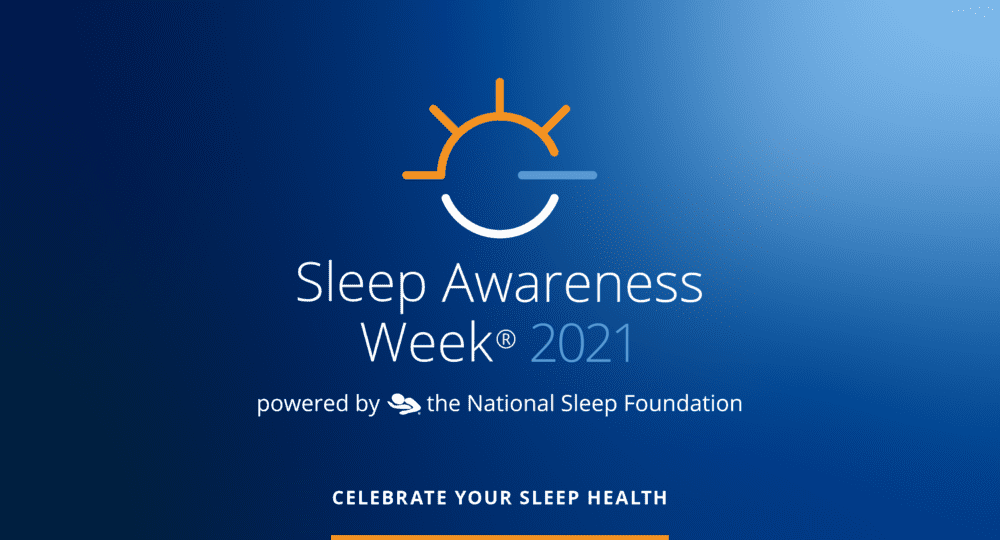Sleep Awareness Week runs this year from March 14-20, 2021, and spotlights the importance of sleep in our daily lives and encourages everyone to learn about habits, practices, and routines that improve our sleep quality and overall health. Sleep is one of the most crucial factors in our overall health and well-being, but how many of us actually get the amount of sleep our bodies need?
- Do you know what factors can interrupt your sleep?
- Do you know what impact a lack of sleep can have on your body?
- Do you know what health benefits are possible if you improve your sleep patterns?
This article will answer all of these important questions for you.
How many hours of sleep does your body need?
According to research completed by Sleep Health, the following sleep guidelines have been published by age group:
- Newborns (0-3 months): 14-17 hours per day
- Infants (4-11 months): 12-15 hours per day
- Toddlers (1-2 years): 11-14 hours per day
- Preschoolers (3-5 years): 10-13 hours per day
- School-age children (6-13 years): 9-11 hours per day
- Teenagers (14-17 years): 8-10 hours per day
- Young adults (18-25 years): 7-9 hours per day
- Adults (26-64 years): 7-9 hours per day
- Older adults (65+ years): 7-8 hours per day
Are you getting the proper amount of sleep after reviewing the chart above? If not, read on to learn how to improve your sleep which will not only help you “feel” more rested but make you healthier overall.
What can interrupt your circadian rhythm (normal sleep/wake cycle)?
- Coffee and other caffeinated beverages
- Energy drinks
- Alcohol
- Light emitted from electronic devices (phones, tablets, computers, televisions)
- Eating an unhealthy diet
- Lack of exercise
- Stress
These factors may seem like no-brainers, but how many of us can say we faithfully avoid them?
What impact can a lack of sleep have on your body?
- Greater risk for serious medical conditions such as:
- Obesity
- Heart disease
- Diabetes
- High blood pressure
- Mood disorders
- Reduced immune function
- Greater risk for costly, preventable accidents
- Decline in mental performance
How can you improve your sleep patterns?
- Stick to a sleep schedule every night of the week (including weekends)
- Avoid eating right before bed
- Learn to relax before bedtime
- Make a “to-do” list for tomorrow – so you do not think about it all night
- Take five deep breaths – to calm your nervous system
- Be aware of your senses – this takes your mind off of sleep – preventing stressful thoughts. Some things to think about when you go to bed in order to calm your mind are:
- think about how soft your blanket is
- think about how comfortable your bed/pillows are
- think about how warm and cozy or cool and refreshed you feel
- listen to noises outside (some people use noise machines during winter months – i.e. birds or crickets chirping, waves crashing into the shore, thunderstorms or raindrops, etc)
- Tense your toes – you may think this will keep you awake, but if you lie on your back, close your eyes and tense and pull your toes up toward your face holding them for a count of 10 and then release them and count to ten again – then repeat this ten times, it will actually help calm your whole body.
- Dim the lights – avoid phones, computers, tablets, and TV at least one hour before bed
- Exercise daily
- Adjust the temperature in your bedroom
- Avoid alcohol and caffeine (although alcohol is a mild sedative and people believe it helps them sleep, what they don’t realize is alcohol only works as a sedative for a short period of time, and as the body processes the alcohol it actually stimulates a part of the brain that causes arousal which can interrupt your sleep).
What health benefits are possible with improved sleep patterns?
- Improved function of your immune system
- Possible weight loss
- Improved mental well being
- Decreased risk of developing Diabetes
- Decreased risk of developing Heart Disease
- Improved sex drive and fertility
- Lower blood pressure
Put your sleepless nights to an end … and start to make sleep a PRIORITY! If you are experiencing prolonged insomnia or other symptoms that you believe are preventing you from sleep, schedule an appointment with a sleep professional.
Put these tips into action and ensure more ZZZ’s with ease!
—
Resources:
https://www.sleepfoundation.org/how-sleep-works/how-much-sleep-do-we-really-need
https://www.sleep.org/articles/get-rid-of-sleep-debt/
https://www.nhs.uk/live-well/sleep-and-tiredness/why-lack-of-sleep-is-bad-for-your-health/
https://www.sleep.org/articles/get-sleep-schedule/
https://www.sleep.org/articles/learning-relax/
Graphic courtesy of The National Sleep Foundation





